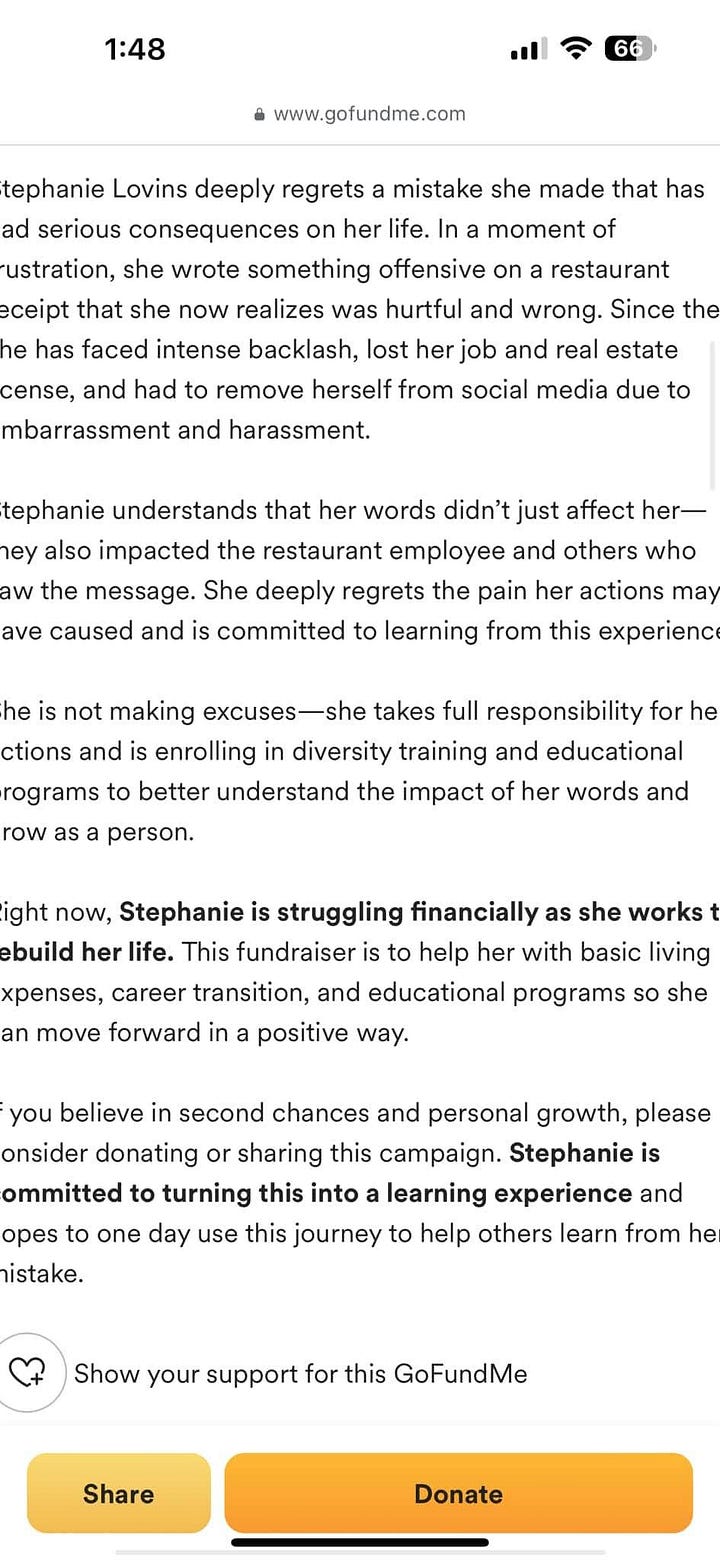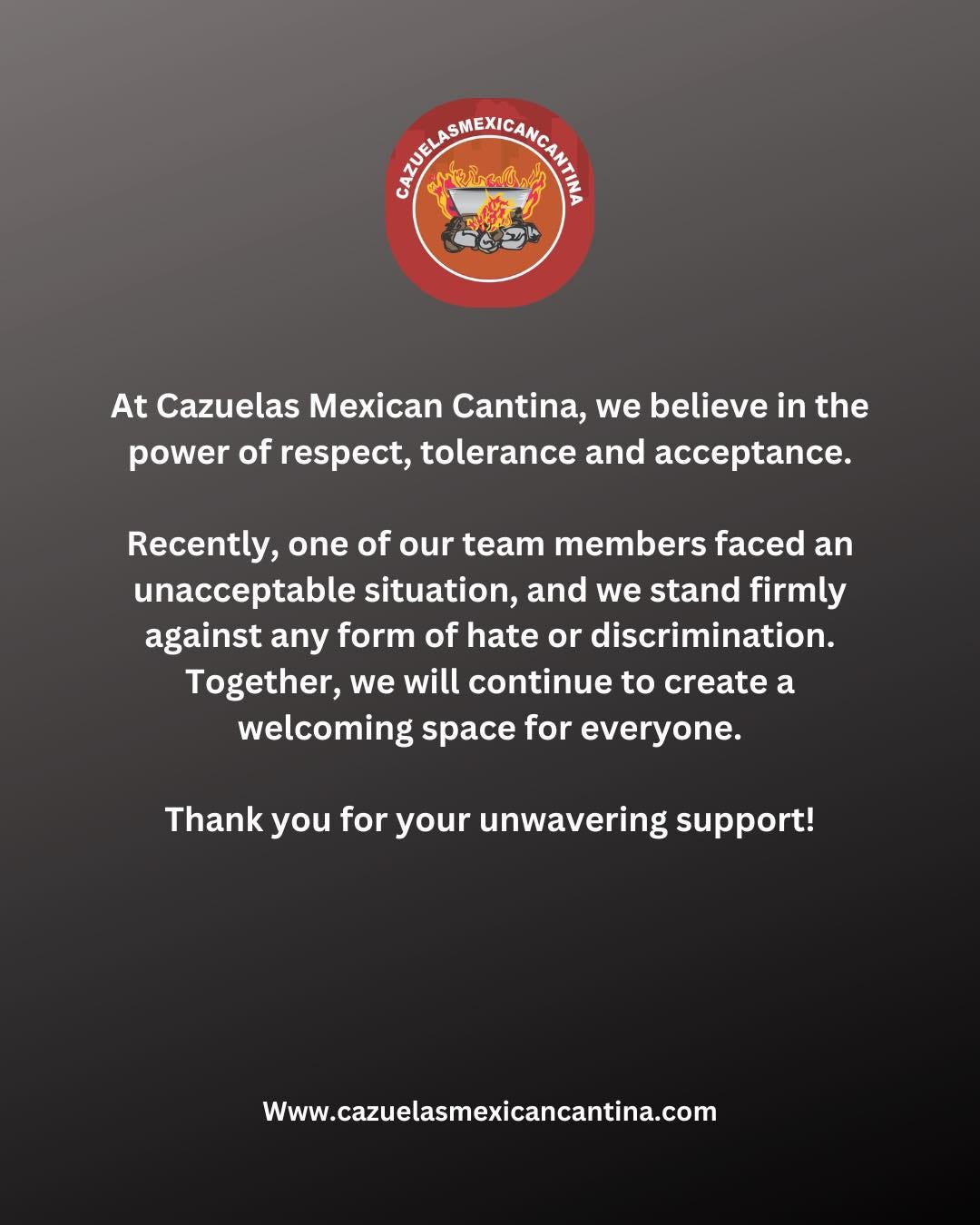When Bigotry Backfires: A Receipt, a Reckoning, and the Everyday Cost of Anti-Immigrant Rhetoric
When a customer at a Mexican restaurant lashed out at a server, she didn’t expect to lose her job over it. A look at how anti-immigrant rhetoric shapes behavior and how communities are pushing back.
“I HOPE TRUMP DEPORTS YOU!!!” That’s the message that Ricardo, a waiter at Cazuelas Mexican Restaurant in Columbus, Ohio, found from a customer who was apparently upset over the restaurant’s coupon policy during a busy Sunday evening service. What happened next to Ricardo, the restaurant, and to the woman who wrote this note provides a window into how anti-immigrant rhetoric polarizes us and ultimately hurts the very people who feel emboldened by Trump’s rhetoric.
This story is personal to me. Cazuelas started out as a small restaurant on North High Street just blocks from the Ohio State University where I went to graduate school. Although Columbus’s west side is home to a large Latino community and some of the best food in town, Cazuelas was one of the first smaller Mexican restaurants that I recall venturing into the campus neighborhood. Since Cazuelas was on my walk home to Clintonville, I would often stop in after my seminars for a late lunch or early dinner. It quickly became one of my favorite places to take friends and colleagues or to escape to for some solitary comfort food.
As my fellow geographer Daniel Arreola’s research shows, the history of Mexican restaurants in the United States is a fascinating story of resilience, creativity, and evolution. Mexican restaurants are among the most visible landmarks of Mexican culture in the United States and, for most white Americans, probably the first (and possibly only) direct exposure they have to Mexican cultural symbols and flavors, even though those symbols and flavors are often artificially restricted and curated for white audiences. For this reason, Mexican restaurants and people who work in them are also uniquely vulnerable to anti-immigrant and anti-Latino sentiment. The unequal power dynamics between paying customers and service workers only exacerbates the potential for prejudice and bigotry to come out.
None of this is helped by our current administration. Trump’s bombastic rhetoric sadly deludes his supporters into believing that they belong to an historical shift in popular consciousness, one that authorizes them to act as deputized ambassadors for their leader in everyday situations. Like any significant public figure, Trump could use his influence for good by setting an example of how to treat people different from us. Instead, his intolerance for others and willingness to vilify others creates a permission structure for intolerant and offensive behavior that trickles down into society.
As I wrote yesterday, I fear that Trump’s executive order making English the official language of the United States will work in this same way by providing everyday Americans with the permission structure to police non-English language use. People who might have been privately annoyed or indignant over hearing another language spoken in public might now feel emboldened to spout off: “You’re in America–speak English!”
I am reminded of what Hannah Arendt once said about authoritarian leaders: “Fascination is a social phenomenon. Society is always prone to accept a person offhand for what he pretends to be, so that a crackpot posing as a genius always has a certain chance to be believed. In modern society, with its characteristic lack of discerning judgement, this tendency is strengthened.” (The Origins of Totalitarianism, page 305, footnote 1.)
However, unlike Donald Trump, who seems immune from real world consequences to his behavior, the rest of us are directly or indirectly governed not by Trump but by bosses and coworkers, professional affiliations, families and friends, religious organizations, law enforcement, and wider social communities, all of whom exert varying degrees of influence over our lives. Trump has spent a lifetime insulating himself from accountability. His followers have not. And while Trump’s reckless and undemocratic pardoning of the January 6 Capitol Breach Cases might contribute to the perception that Trump’s supporters can also escape accountability, there is still a large and lively fraction of society that has little patience for bigotry.
Bigotry was exactly what I saw on display this week in Columbus. On Monday, Cazuelas restaurant publicly announced that they had an incident of discrimination at one of their restaurants. (Remember: Columbus is just 45 minutes away from Springfield, Ohio, made popular by the heinous misinformation about Haitian migrants.)
The initial announcement left much to the imagination. But the following day Isabel Nathalie, who posted online “Yall hate us but love our food.” with a photo of a customer receipt with the words “ZERO, YOU SUCK.” in the tip line and “I HOPE TRUMP DEPORTS YOU!!!” on the signature line. The customer scratched out her name and other information in a futile attempt to hide her identity, but another copy of the receipt revealed her full name anyway. Isabel’s post goes on to say, “Shame on you Stephanie for not having the courage to say it with your chest.”
The incident continued to play out publicly online in ways that the customer never intended. The customer that we now know as Stephanie, a local Realtor, posted on her LinkedIn and Facebook accounts that her credit cards had been stolen–an obvious lie that was quickly called into question. Cazuelas restaurant reviewed security footage and confirmed Stephanie’s identity. Then came the ultimate consequence: Stephanie’s employer, Columbus REALTORS, told reporters that they had conducted an investigation and terminated her employment that she was not part of the brand (see addendum below for the correction).
GoFundMe became a bigger part of this story than you might imagine. A GoFundMe page for Ricardo set to raise $1,000 has now raised over $27,000 and continues to grow. Good for Ricardo. Let’s hope Ricardo safely receives the money and gets good advice on avoiding any tax issues with this windfall.
After facing these very public consequences, Stephanie seems to have come around to the idea of learning from the situation, as well. After her termination, a GoFundMe page was set up in her name with a goal of raising $5,000. The statement on the GoFundMe page claims that she is learning from this experience but struggling financially as a result of losing her job (as marketing coordinator for Seniors Helping Seniors; added 03/10/2025) and her real estate license. After raising $1,000, the GoFundMe page, like the rest of Stephanie’s social media accounts, appears to have been deleted.


I realize this all feels a little bit like tabloid news, but I don’t intend it that way. I think this is an important case study in the real-world consequences of casual bigotry that Trump engenders, especially in the form of telling someone that you hope they get deported. Deportation is a major traumatic event for an individual person, their families, and whole communities. Wishing it on someone in a moment of anger, especially someone in a service position whose livelihood depends on customers’ tips, is the kind of punching down moment that turns my stomach.
This situation crystalizes the reason why so many of us who study immigration emphasize the racial dimensions of anti-immigrant rhetoric, even when public officials claim they are only going after people based on their legal status. Skin color is not equivalent to immigration status, but it has become synonymous in the social imaginations of far too many people. Ricardo, the server in this story, is a natural born citizen of the United States with Latino heritage. Equating Latinos with people who should be deported actually reveals a deeper truth about how Trump’s immigration policies function as tools of racial stigmatization as much as they do instruments of so-called law and order.
While Stephanie is paying the consequences for her own poor judgement, I cannot help but see the Stephanies of the world as pawns (willing pawns, but pawns) in our nation’s absurd culture wars–and pawns are made to be sacrificed. People don’t own ideas—sometimes ideas own people, and now Stephanie is paying (literally) for the consequences of anti-immigrant rhetoric actively encouraged from the highest offices in our country. It is essential that we understand this situation not only as a singular question of interpersonal bigotry, but as a symptom of the rise of a deeper disease of hate that this president is trying to normalize. We cannot let this behavior become normalized. We simply cannot.
As sad as I was to see how Ricardo was treated, I was also proud to see the Columbus community come together to protect Cazuelas as a local establishment. I also sincerely wish Stephanie the best of all possible life trajectories. While this might be painfully public in the moment, she could use this newfound realization as an opportunity to bring people around her (who probably helped normalize these prejudicial views for her) into a better understanding of what immigrants face and the dangers of adopting Trump’s divisive language.
Now go have a nice meal at your local Mexican restaurant—and don’t forget to tip well!
This newsletter is only possible because of your support. If you believe in keeping this work un-paywalled and freely open to the public, consider becoming a paid subscriber. You can read more about the mission and focus of this newsletter and learn why, after three years, I finally decided to offer a paid option.
Consider Supporting Public Scholarship
Thank you for reading. Please subscribe to receive this newsletter in your inbox and share it online or with friends and colleagues. If you believe in this work, consider supporting it through a paid subscription. Learn more about the mission and the person behind this newsletter.
Addendum (03/10/2025)
Brent Miller, a real estate agent in Columbus that I’ve known for years and trust, added important context in a comment below that is worth including in the main article just to make sure everyone has the full story. An important part of Stephanie’s narrative arc in this story is that she faced professional consequences for her behavior, which she did, but not exactly in the way it was previously reported. It was reported that Stephanie lost her job as a realtor and lost her realtor’s license. Brent raised two points about this. First, Brent was not able to find real estate transactions under Stephanie’s name and noted that she did not renew her real estate license for the current year, suggesting that she was not practicing as a real estate agent in any meaningful way. Second, Brent emphasized that realtors do not work for anyone and do not get paid a salary, which means that any insinuation that she “lost her job” due to this situation would not be an accurate way to represent the consequences she faced. (Brent said that Stephanie’s husband’s business does seem to be facing professional consequences.) Brent said that CENTURY 21 returned Stephanie’s license, which is their way of saying that she cannot renew her license with them, as a brokerage company, but she could reinstate her license with a different brokerage company. Brent’s comment adds context to the statement CENTURY 21 gave to Newsweek: "After investigating the situation and connecting with the respective broker, as all companies affiliated with the CENTURY 21 brand are independently owned and operated, we can confirm that this agent is no longer affiliated with the brand."
I learned from other people in Columbus that she did lose her job at a place called Seniors Helping Seniors, but she was employed as a marketing coordinator, not a realtor. If I understand this correctly now, then I take Brent’s point that the professional consequences that Stephanie faced were (1) not as directly and immediately severe as losing her job as a realtor (she did lose her other job) and (2) not exactly part of local realtors or her employer “taking a stand” against her behavior. In my defense (and Brent acknowledges this), news reports did say that she lost her job as a realtor but I can see now why that’s not exactly how being a realtor works. Stephanie’s GoFundMe page (which has been removed) said that she lost her job and her license due to this incident; I had initially understood that to mean her realtor position, but as I clarified above, other folks in Columbus now tell me that this referred to her position as a marketing coordinator for Seniors Helping Seniors.









While I welcome substantive engagement of this post and encourage public debate, identity-based slurs of any kind will not be tolerated in the comments. This is a zero tolerance policy. Users who violate this will be immediately and permanently banned.
Well said. Although it’s far down the list of the horrible things Trump has done, I don’t think it’s discussed enough how much more unpleasant he’s made normal social life. The temperature is turned up so high that ordinary disagreements get turned into a life-changing, relationship-destroying battle between good and evil. Probably everyone knows someone whose family no longer goes to the same house on Thanksgiving as they did before Trump because of some stupid political argument.
Anyways, I had my first date with my fiancee at Cazuela’s! Best thing on the menu there is the carnitas platter, which comes with a stuffed bacon wrapped jalapeño.